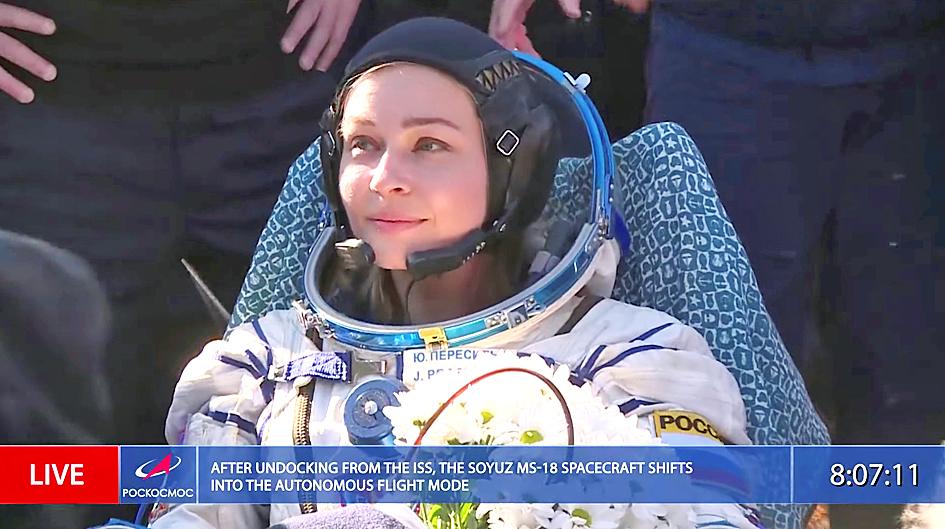Russian actress Yulia Peresild and film director Klim Shipenko yesterday returned to Earth after spending 12 days on the International Space Station (ISS) shooting scenes for the first movie in orbit.
Peresild and Shipenko landed as scheduled on the Kazakh Steppe steppe at 4:36am GMT, footage broadcast live by the Russian space agency showed.
They were ferried back to terra firma by Russian cosmonaut Oleg Novitsky, who had been on the space station for the past six months.

Photo: Roscosmos / Handout via Reuters
“The descent vehicle of the crewed spacecraft Soyuz MS-18 is standing upright and is secure. The crew are feeling good!” Russian space agency Roscosmos wrote on Twitter.
The filmmakers had blasted off from the Russia-leased Baikonur Cosmodrome in Kazakhstan earlier this month, traveling to the ISS with veteran Russian cosmonaut Anton Shkaplerov to film scenes for The Challenge.
If the project stays on track, the Russian crew would beat a Hollywood project announced last year by Mission Impossible star Tom Cruise together with NASA and Space Exploration Technologies Corp.
The movie’s plot, which has been mostly kept under wraps along with its budget, centers around a surgeon who is dispatched to the ISS to save a cosmonaut.
Shkaplerov, 49, along with the two Russian cosmonauts who were already aboard the ISS are said to have cameo roles in the film.
The mission was not without small hitches.
As the film crew docked at the ISS earlier this month, Shkaplerov had to switch to manual control, and when Russian flight controllers on Friday conducted a test on the Soyuz MS-18 spacecraft the ship’s thruster fired unexpectedly and destabilized the ISS for 30 minutes, a NASA spokesman told Russian news agency TASS.
However, the spokesman confirmed that their departure was to go ahead as scheduled.
Their landing, which was documented by a film crew, is also to feature in the movie, said Konstantin Ernst, chief executive officer of the Channel One Russia TV network and a coproducer of The Challenge.
The mission adds to a long list of firsts for Russia’s space industry.
The Soviets launched the first satellite Sputnik, and sent into orbit the first animal, a dog named Laika, the first man, Yuri Gagarin and the first woman, Valentina Tereshkova.
Yet compared with the Soviet era, modern Russia has struggled to innovate and its space industry is fighting to secure state funding with the Kremlin prioritizing military spending. Russia is also falling behind in the global space race, facing tough competition from the US and China.
In a bid to spruce up its image and diversify its revenue, Russia’s space program revealed this year that it would be reviving its tourism plan to ferry fee-paying adventurers to the ISS.
After a decade-long pause, Russia is to send two Japanese tourists — including billionaire Yusaku Maezawa — to the ISS in December, capping a year that has been a milestone for amateur space travel.

BOMBARDMENT: Moscow sent more than 440 drones and 32 missiles, Volodymyr Zelenskiy said, in ‘one of the most terrifying strikes’ on the capital in recent months A nighttime Russian missile and drone bombardment of Ukraine killed at least 15 people and injured 116 while they slept in their homes, local officials said yesterday, with the main barrage centering on the capital, Kyiv. Kyiv City Military Administration head Tymur Tkachenko said 14 people were killed and 99 were injured as explosions echoed across the city for hours during the night. The bombardment demolished a nine-story residential building, destroying dozens of apartments. Emergency workers were at the scene to rescue people from under the rubble. Russia flung more than 440 drones and 32 missiles at Ukraine, Ukrainian President Volodymyr Zelenskiy

‘SHORTSIGHTED’: Using aid as leverage is punitive, would not be regarded well among Pacific Island nations and would further open the door for China, an academic said New Zealand has suspended millions of dollars in budget funding to the Cook Islands, it said yesterday, as the relationship between the two constitutionally linked countries continues to deteriorate amid the island group’s deepening ties with China. A spokesperson for New Zealand Minister of Foreign Affairs Winston Peters said in a statement that New Zealand early this month decided to suspend payment of NZ$18.2 million (US$11 million) in core sector support funding for this year and next year as it “relies on a high trust bilateral relationship.” New Zealand and Australia have become increasingly cautious about China’s growing presence in the Pacific

Indonesia’s Mount Lewotobi Laki-Laki yesterday erupted again with giant ash and smoke plumes after forcing evacuations of villages and flight cancelations, including to and from the resort island of Bali. Several eruptions sent ash up to 5km into the sky on Tuesday evening to yesterday afternoon. An eruption on Tuesday afternoon sent thick, gray clouds 10km into the sky that expanded into a mushroom-shaped ash cloud visible as much as 150km kilometers away. The eruption alert was raised on Tuesday to the highest level and the danger zone where people are recommended to leave was expanded to 8km from the crater. Officers also

ESPIONAGE: The British government’s decision on the proposed embassy hinges on the security of underground data cables, a former diplomat has said A US intervention over China’s proposed new embassy in London has thrown a potential resolution “up in the air,” campaigners have said, amid concerns over the site’s proximity to a sensitive hub of critical communication cables. The furor over a new “super-embassy” on the edge of London’s financial district was reignited last week when the White House said it was “deeply concerned” over potential Chinese access to “the sensitive communications of one of our closest allies.” The Dutch parliament has also raised concerns about Beijing’s ideal location of Royal Mint Court, on the edge of the City of London, which has so